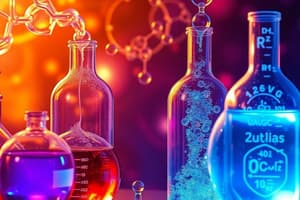Podcast
Questions and Answers
What is the key functional group present in alcohols?
What is the key functional group present in alcohols?
- Ester
- Ketone
- Hydroxyl (-OH) (correct)
- Alkene
Which method can be used for the purification of alcohols based on their specific properties?
Which method can be used for the purification of alcohols based on their specific properties?
- Chromatography of gases
- Sublimation
- Distillation of mixtures
- Recrystallization (correct)
What type of reaction can alcohols undergo to form alkenes?
What type of reaction can alcohols undergo to form alkenes?
- Esterification
- Oxidation
- Hydrogenation
- Dehydration (correct)
Which type of reaction mechanism do alcohols participate in that involves both SN1 and SN2 processes?
Which type of reaction mechanism do alcohols participate in that involves both SN1 and SN2 processes?
Which process involves the formation of alcohols from reduction of carbonyl compounds?
Which process involves the formation of alcohols from reduction of carbonyl compounds?
In alcohol chemistry, what is a notable transformation where ethanol reacts with bromine in the presence of a Lewis acid?
In alcohol chemistry, what is a notable transformation where ethanol reacts with bromine in the presence of a Lewis acid?
What class of organic compounds is formed by the reaction of alcohols with alkyl halides?
What class of organic compounds is formed by the reaction of alcohols with alkyl halides?
Which solvent is increasingly important in Pd-catalyzed C–H activation reactions?
Which solvent is increasingly important in Pd-catalyzed C–H activation reactions?
What are hemiacetals and acetals formed by the reaction of alcohols with?
What are hemiacetals and acetals formed by the reaction of alcohols with?
What is the main focus of boronic acid based dynamic click chemistry?
What is the main focus of boronic acid based dynamic click chemistry?
Which type of oxidation process can transform alcohols into aldehydes, ketones, or carboxylic acids?
Which type of oxidation process can transform alcohols into aldehydes, ketones, or carboxylic acids?
In the context of organic chemistry, what does the use of water as a solvent offer as an alternative to traditional solvents?
In the context of organic chemistry, what does the use of water as a solvent offer as an alternative to traditional solvents?
Flashcards are hidden until you start studying
Study Notes
Exploring Alcohol Chemistry in Organic Chemistry
Alcohols, characterized by their hydroxyl (-OH) functional group, are an essential class of organic compounds. Their chemistry encompasses a wide array of transformations, reactions, and applications, contributing significantly to the field of organic chemistry. In this article, we'll delve into the fascinating world of alcohol chemistry, focusing on recent developments and key aspects.
Synthesis and Purification
Alcohols can be synthesized via various methods, including reduction of carbonyl compounds, hydroxylation of alkenes, and other strategic approaches. Purification techniques include fractional distillation, crystallization, and chromatography, with the choice of method depending on the specific properties of the alcohol in question.
Reaction Mechanisms and Properties
Alcohols can act as nucleophiles, acids, and bases, exhibiting diverse reactivity. They participate in a range of reactions, such as:
- Acid-catalyzed dehydration to form alkenes.
- Nucleophilic substitution, including the SN1 and SN2 mechanisms.
- Reduction of carbonyl compounds to form alcohols through processes like hydrogenation.
- Esterification and transesterification reactions.
Transformations
Alcohols undergo transformations to generate a diverse array of functional groups and products. Notable examples include:
- Ethanol to ethyl bromide: Reaction with bromine in the presence of a Lewis acid, forming ethyl bromide.
- Alcohol oxidation: Alcohols can be transformed into aldehydes, ketones, or carboxylic acids via oxidation processes like the Swern, Jones, or Baeyer-Villiger oxidation.
- Acylation: Reaction with acyl chlorides or anhydrides in the presence of an acid catalyst, forming esters.
Derivatives and Special Applications
- Ethers: Formed via the reaction of alcohols with alkyl halides, ether formation is an important class of organic compounds with unique properties and applications.
- Aldehydes and ketones: Alcohol oxidation provides a straightforward route to aldehydes and ketones, which serve as important building blocks in organic synthesis.
- Hemiacetals and acetals: Formed by the reaction of alcohols with aldehydes or ketones, hemiacetals and acetals have unique properties that make them useful in various applications.
Recent Advances
- Boronic acid based dynamic click chemistry: A growing field focused on the use of boronic acids to facilitate highly specific and versatile reactions, expanding the possibilities for organic synthesis.
- Water as a reaction medium: The use of water as a solvent in organic chemistry offers a sustainable and efficient alternative to the traditional use of organic solvents.
- Heptafluoroisopropanol: This solvent is playing an increasingly important role in the practice of Pd-catalyzed C–H activation reactions.
Conclusion
Alcohol chemistry remains a vibrant and dynamic aspect of organic chemistry. Its applications span a wide range of areas, from fundamental research to industrial production. The continuous discovery of new reactions, transformations, and applications for alcohols demonstrates the importance of this class of organic compounds and the immense potential for future research.
Studying That Suits You
Use AI to generate personalized quizzes and flashcards to suit your learning preferences.




